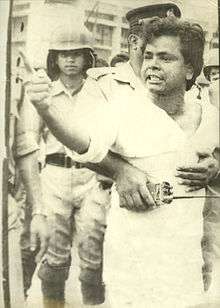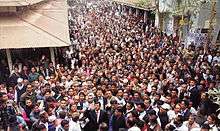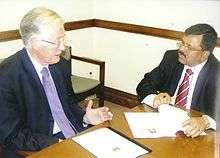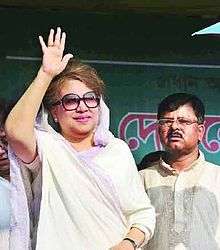Ilias Ali
Ilias / Ilyas Ali (born 1961) is a Bangladeshi politician from Sylhet district and a former member of the Jatiyo Sangshad (Bangladesh Parliament) (2001–2006). Chosen in 2010 as the Organizing Secretary of the Bangladesh National Party (BNP), he has a prominent role in coordinating events and programmes, ranging from hartal (general strikes) to protests, demonstrations and party gatherings. He and his chauffeur were last seen at midnight in the capital of Dhaka on April 17, 2012. Khaleda Zia, BNP leader, alleged they were kidnapped by Awami League security forces as part of suppression of the opposition, but the government has denied that.
Early life and education
Ilias / Ilyas Ali was born in Ramdhana, Sylhet Division. As a child, he was taught lessons from the Qur'an by his mother. Ali had his primary education at Ramdhana Government Primary School. He passed his SSC in 1977 from Ramshundor Pilot High School, Bishwanath Upazila. In 1979, he passed his HSC from Sylhet Government College. He graduated B.Com (Hons) from Dhaka University in 1985 from the department of Finance. He did graduate work in M.Com (Masters) at Dhaka University in banking, but was expelled in 1987 after leading a student movement against the martial law of President Hossain Mohammad Ershad.
Marriage and family
Ilias Ali is married to Tahsina Rushdir, an Deputy Registrar at Dhaka University. They have two sons and a daughter. Their elder son Md. Abrar Elias is studying at University of the West of England, and the younger son Md. Labib Sharar is studying in Coventry University. The youngest child, Saiara Nawal, studies in Bangladesh Int. School and College in Class VI.
Political career
Student politics

He started his political career in 1980 with the student wing of the BNP, Jatiyatabadi Chhatra Dal, founded the year before. He lived in Kobi Joshim Uddin hall of Dhaka University. In a couple of years, he became leader of the dorm, and in 1983 became a central executive member of Jatiyatabadi Chhatra Dal (JCD).
In 1986, the National Council of JCD was held, where he was elected as the International Affairs Secretary of the Central Executive Committee. At that time, JCD was the most powerful student political organization in the country.
Hossain Mohammad Ershad was elected as president in 1986, although BNP boycotted the election. While recognizing that Ershad had restored some political rights, BNP and the Awami League heightened political pressure to fully restore a parliamentary democracy in the country, and both had many students willing to protest for the cause. In 1987, Ershad ordered the expulsion of nine JCD student leaders from the Dhaka University, including Ilias Ali. He was arrested in 1988 for political activities. After seven months of prison, Ali was released from jail by the order of the Bangladesh Supreme Court. He was repeatedly arrested and released on bail.
In February 1990, Ali was arrested while JCD prepared for a protest march. After his arrest, violence increased on campus at Dhaka University, with conflict between students and police. In July 1990, Ali was released from jail by order of the Bangladesh Supreme Court. In the meantime, the anti-Ershad movement crossed party lines; its protests disrupted and slowed down the economy.
Ershad finally agreed to resign from his Presidency in order that multi-party elections could be held again. On 6 December 1990 the recent Chief Justice Shahabuddin was appointed as Chief Advisor for a caretaker government. Ilias Ali and many of his colleagues were released from Dhaka Central jail.
In 1991, general elections were held, and the BNP took the majority. Khaleda Zia became prime minister. In 1992 the national council of JCD was held, and Ali was elected General Secretary of Jatiyotabadi Chhatra Dal.
Political career
Ilias Ali was elected in 2001 to the 6th Parliament as a representative of the BNP. He hails from Bishwanath Upazila and represents Sylhet-2. He won by approximately 49,000 votes.[1]
At the 5th national council of the BNP, on 8 December 2009, Ilias Ali spoke as president of Sylhet district. The councillors approved giving authority to Khaleda Zia, head of the party, to choose the leadership. Ali spoke in favor of promoting Tarique Rahman, the eldest son of Khaleda Zia, who is active in the BNP and is now second in power to his mother. On 1 January 2010, Ali was chosen as Organizing Secretary of the BNP.
Rivalry with Saifur Rahman
In the years of 2005 and 2006, when the BNP controlled the government, a leadership conflict arose within the Sylhet BNP between Saifur Rahman, an MP who was serving as the Finance Minister under Khaleda Zia, and Ilias Ali, then a member of parliament. On May 28, 2005, the BNP had suspended the Sylhet convening committee in the wake of discord between loyalists of the two leaders.
The following year, relations were still strained. On 26 May 2006, some activists struck at Ilias' residence in Sylhet following his reported unfavorable remarks about the finance minister. The rival sides clashed in the city next day. Ilias activists demonstrated, blaming the finance minister for the attack on their leader's house. Aggrieved, Saifur threatened to resign from the government unless action was taken against Ali and his loyalists. Reporters suggested he was trying to protect his own son's status in the BNP.[2] At one stage, Saifur Rahman demanded that Khaleda expel Ali from the party.
About Saifur's potential resignation in 2006, a BNP leader said,
The resignation threat was just a strategy to put pressure to ensure Ilyas Ali's expulsion. Saifur Rahman was worried about his son Naser Rahman's future in the party and considers Ilias an opponent in the district's party politics.
The prime minister was said to have been unhappy about the conflict between her party leaders.[3]
To blunt the conflict, in June 2006 the BNP dissolved the Sylhet district convening committee, which Ali had led.[4][5][6] The party sought to limit district competition among its politicians. All BNP MPs in Sylhet were advised they would have to take over their own organisational activities in their respective constituencies. BNP leaders would handle it for areas that did not have party MPs at the time.
In response to a press inquiry, Ilias said he had talks with the BNP chairperson on organizational matters in Sylhet district. He declined to comment on the discord with Saifur. Khaleda Zia and other senior leaders of the party talked with both men and did not expel Ali.[7]
On 9 December 2006, Ali was shot at by unidentified gunmen while in his Jeep in front of the Osmaninagar Police station, after returning from an election campaign meeting in his constituency. He was unhurt but the vehicle was damaged. After this incident, his supporters quickly blocked the highway for a time. Ali said he thought the attack was made by Awami League supporters. He filed a criminal case, but no investigation took place.
2007 Corruption charges
Following the resignation of the BNP government at its end of term in late October 2006, there were political protests and violence. In accordance with the constitution, a caretaker government (CTG) was established to manage the general elections to be held within 90 days. In early January, the Awami League and its allies withdrew from the election. On January 11, 2007, President Iajuddin Ahmed, Chief Advisor of the CTG, imposed a state of emergency. He was backed by the military, which wanted to restore stability.
The interim government selected Fakhruddin Ahmed, a prominent banker who had worked with the World Bank, as Chief Advisor following the resignation of Iajuddin Ahmed. Ahmed continued as President, which under the CTG included the Defense Ministry.[8] Having vowed to clean up corruption, in the spring of 2007 the caretaker government filed charges against 160 persons, including Tarique Rahman, the BNP Senior Joint Secretary General, his brother Arafat Rahman, and their mother Khaleda Zia, the former prime minister, as well as many other politicians, civil servants and businessmen. Later that year, the government filed corruption and murder charges against Sheikh Hasina, head of the Awami League and also a former prime minister.
After Ali and his wife were among those charged with corruption, they left the country. They did not return until 28 July 2008, when they had been granted bail by the High Court.[9] On 10 August 2008, Ali got anticipatory bail from the High Court related to an extortion charge in another case; a Union Parishad member in Sylhet had sued him in April 2007 for extorting Tk 5 lakh from her.[10]
2008 election/change of government
The ninth parliament election was held on 29 December 2008. In Sylhet-2, the Awami League candidate Shafikur Rahman won with 109,000 votes. Ilias Ali got 106,000 votes. People in the area reportedly found abandoned ballots and collected them. Ilias Ali took the ballots to Dhaka to the BNP office. He and the BNP secretary general, Khondaker Delowar Hossain, held a press conference, claiming the loose ballots were evidence of a fabricated election.
Biswanath police in Sylhet filed charges against Ilias Ali and nearly 50 local BNP leaders, for obstructing them as the police seized scattered ballot papers the day after the Dec 29 election.[11] On 19 January 2010, Ali and 42 others got anticipatory bail from the High Court. It ordered the government to show cause within four weeks as to why the petitioners should not be granted permanent bail in this case.[11]

In January 2009, the Awami League government filed charges of conspiracy against Ilias Ali and 250 BNP members. He accused the government of harassment and attempting to repress the opposition. In December 2011 the government filed six cases against him.[12]
Opposition activities

In August 2011, Ali went to the United Kingdom (UK), where he participated in numerous meetings with fellow politicians and party members. According to the daily Bengali newspaper, Amar Desh, he met with British politicians including Baroness Sayeeda Warsi, Co-Chairman of the British Conservative Party and Cabinet Minister; William Hegue, Foreign Minister; Ed Miliband, Leader of the Opposition; AM Ohid Ahmed, Deputy Mayor of Tower Hamlets, a center of Bangladeshi population, as well as several MPs. While in the UK, he complained of human rights violations under the Awami League government.
Long March
As Organizing Secretary, Ali had major responsibilities for the "Long March," announced for 1 October 2011 by Khaleda Zia as a protest against the government's progress in a joint land survey and resolution of issues with long-disputed lands along the Sylhet-Meghalaya and Sylhet-Assam borders to India. As a result of the survey, Bangladesh ceded more than 200 acres in this area.[13]
At the end of the Long March, there was a rally of Lacs (100 thousand) people at the Madrasa. In addition to Khaleda Zia, Ilias Ali and Mahmudur Rahman, editor of Amar Desh and former BNP energy advisor, were speakers. Ali spoke about resisting changes to land tenure in the border area.
Since the survey had been done, local residents complained that they were being barred from ploughing croplands and fishing on the Jaintapur and Gowainghat borders. Two Bangladeshis were shot dead and at least 20 others injured in clashes in 2011 in the two months preceding the Long March.[13] Locals under the forum 'Amra Simantabashi' (We are the border people) have been raising protest against the survey. The forum is mainly dominated by the political opposition leaders of the region.[13]

In preparation for the Long March, Ali arranged for a grand rally at Sylhet Aliyah Madrasha. He had leaflets describing the event printed and distributed in Sylhet and the key areas of Bondor Bazar, Court Point, Zindabazar, Amborkhana and others.
During the Long March, Khaleda Zia traveled through a total of six districts, stopping to speak to crowds at public and street rallies.[14] On 11 October, a rally was scheduled at Aliya Madrasha field. Thousands of people had gathered in the city; estimates were that it was the biggest rally in the city since the Awami League had assumed office in January 2009. Four-Party Alliance supporters gathered from several districts.
Protest against Tipaimukh Dam
The BNP was concerned about India's construction of the Tipaimukh Dam on the Barak River, which enters northeastern Bangladesh at Amalshid in Zakigonj. They believe it will have adverse effects in the region and contribute to desertification. The dam was planned decades ago, but resistance has developed against the project.
In late 2011, Ali organized a day-long hartal (strike) and protests in the Sylhet district on December 1 to protest the Indian project. His programme also included mass rallies over several days, with participation by the BNP student group, Jatiyatabadi Chhatra Dal (JCD), as well as a rally and procession by Jatiyatabadi Shechhasebak Dal, and other front organizations.[15] He urged all political parties to protest the Indian project. He said that, if the dam were not stopped, the protest movement would continue.
The strike and protests proceeded without violent incident. Ali announced the BNP would stage other events, such as a human chain, hunger strike and grand rally at Amalshid, where the Barak River enters Bangladesh.
Disappearance
On Tuesday, 17 April 2012, Ilias Ali disappeared after last being seen in Dhaka at midnight with his driver. His private car was found by police near his Dhaka home, but the two men remain missing as of 14 April 2012. The BNP announced plans for a hartal (general strike) in Sylhet in protest. The police said that BNP supporters had barricaded roads of the district and they were being called in.[16]
BNP members have also clashed with police in protests in Dhaka since his disappearance, where more than 30 people have been injured.[17] By April 22, conflicts had taken place especially in Sylhet and Dhaka; demonstrations and protests had also occurred elsewhere.[17] Ali is the latest in a series of political activists who have disappeared: in 2012 there had been 22 already, according to Ain o Salish Kendra, a human rights organization, and 51 went missing in 2011.[17] Human rights activists noted that Bangladesh has had problems enforcing the rule of law and good governance.[17]
Khaleda Zia alleged that the Awami League government was responsible, which it denied. Observers worry that a campaign of intimidation against the opposition is being waged by security forces, including the Rapid Action Battalion paramilitary unit, established eight years ago under the BNP government, and local police, to benefit the government of Sheikh Hasina.[17]
BNP supporters led day-long hartals (strikes) for three consecutive days on April 23, 24 and 25 in the week following Ali's disappearance. Based on a petition from Ali's wife, ten government security agencies had to respond to the High Court's demands to produce Ali within 10 days; two had responded within the deadline, saying they did not have him nor know of his whereabouts, and the remainder were expected to say the same.[18]
No groups took credit for his disappearance, nor was a ransom asked for, as is sometimes the case with criminals.[19] By early May, five people died and scores were injured in the first several days of protests by the opposition. Bombs were set off in Dhaka. As a result, the government charged 44 top opposition leaders for not controlling the violence.[19]
See also
References
- ↑ "List of Constituency", Bangla2000 website
- ↑ "BNP clips Sylhet lawmakers' wings", The Daily Star, 29 May 2006
- ↑ "Saifur likely to quit politics after budget", The Daily Star, 3 June 2006
- ↑ "Saifur takes three days to decide on resignation", Daily Star, 1 June 2006
- ↑ "Sylhet elite find 'conspiracy' against Saifur", Daily Star, 4 June 2006
- ↑ "Deadline over, Saifur yet to announce decision", Daily Star, 5 June 2006
- ↑ "Unhappy Saifur meets PM", Daily Star, 2 June 2006
- ↑ Ilias Ali appears, disappears from HC, Daily Star, 28 July 2008
- ↑ "Ilias Ali granted HC bail", Daily Star, 11 August 2008
- ↑ "Engr Mosharraf, Ilias Ali granted HC bail", Bangladesh News
- 1 2 "Ilias, 42 other BNP leaders get bail in ballot paper case", BDNews24,
- ↑ "Ilias Ali, 65 others get anticipatory bail" bdnews24, 3 January 2012
- 1 2 3 "Long march held in Sylhet" The Daily Star, 2013
- ↑ Islam, Khadimul; Monir, Zaman (11 October 2011). "Khaleda says won't leave streets until govt falls". New Age. Archived from the original on 24 November 2011.
- ↑ Sylhet staff correspondent, "Sylhet BNP calls hartal on Dec 1", Daily Star, 23 November 2011, accessed
- ↑ "BNP calls hartal in Sylhet for Thursday", Bangla News24, 18 April 2012
- 1 2 3 4 5 Saad Hamadi and Jason Burke, "Bangladesh police out in force as tension rises over missing politician", The Guardian, 22 April 2012, accessed 30 April 2013
- ↑ M Moneruzzaman, "CID, SB deny having detained Ilias Ali", New Age, 30 April 2012, accessed 30 April 2013
- 1 2 FARID HOSSAIN, "Ilyas Ali, Bangladesh Politician, Kidnapping Sparks Bangladesh Crisis", Huffington Post, 9 May 2012, accessed 30 April 2013
Further reading
- ওসমানীনগরে ইলিয়াস আলীর গাড়িতে সন্ত্রাসীদের গুলি [Ilias car osamaninagare terrorist funds]. Samakal (in Bengali). 10 December 2006.
- মান্নান ভূঁইয়াসহ দশ ভিআইপির জামিন [Mannan Bhuiyan ten VIP security]. Samakal (in Bengali). 29 July 2008. Archived from the original on 2 April 2012.
- ইঞ্জিনিয়ার মোশাররফকে জামিন, ফের গ্রেফতার হয়রানি করা যাবে না [Engineer Musharraf bail, harassment can not be arrested]. Samakal (in Bengali). 11 August 2008. Archived from the original on 2 April 2012.
- "Tarique BNP er Kandari". Samakal (in Bengali). 9 December 2009.
- সিলেটে সংবর্ধনায় ইলিয়াস আলী : তাঁবেদার সরকারের বিরুদ্ধে গণআন্দোলন গড়ে তুলতে হবে [Sylhet reception Ilias Ali: We have to build a mass movement against the puppet government]. Amar Desh (in Bengali). 14 January 2010. Archived from the original on 17 March 2012.
- তারেক রহমানের তৃতীয় কারামুক্তি দিবসে লন্ডনে সমাবেশ [Tareq Rahman's release from prison on the day of the London Assembly]. Amar Desh (in Bengali). 6 September 2011. Archived from the original on 31 March 2012.
- প্রভাবশালী দুই ব্রিটিশ মন্ত্রীর সঙ্গে বৈঠকে ইলিয়াস আলী [During the meeting with the British Minister Ilyas Ali influential]. Amar Desh (in Bengali). 8 September 2011. Archived from the original on 31 March 2012.
- তিন প্রভাবশালী ব্রিটিশ এমপির সঙ্গে ইলিয়াস আলীর বৈঠক [Ilias meeting with the influential British MPs]. Amar Desh (in Bengali). 11 September 2011. Archived from the original on 31 March 2012.
- আমরা সীমান্তবাসীর লংমার্চ কাঁপিয়ে দিলো সিলেট [Shimantobashi Long March]. Mzamin (in Bengali). 1 October 2011. Archived from the original on 11 December 2011.
- দেশের ... হাতে নিতে হবে [Country ... Will Take Over]. Jugantor (in Bengali). 2 October 2011. Archived from the original on 25 April 2012.
- সিলেট অভিমুখে খালেদা জিয়ার রোডমার্চের ব্যাপক প্রস্তুতি [Khaleda Zia's road march towards Sylhet extensive preparation]. Amar Desh (in Bengali). 8 October 2011. Archived from the original on 31 March 2012.*বাদী জানেন না তিনি বাদী! [Plaintiff the complainant did not know!]. Prothom Alo (in Bengali). 22 December 2011. Archived from the original on 8 January 2012.
- ইলিয়াস আলীসহ ১১২ বিএনপি নেতাকর্মীর জামিন লাভ [Ilias Ali won 112 BNP activists on bail]. Amar Desh (in Bengali). 28 December 2011. Archived from the original on 20 January 2012.
- মামলার জালে বিএনপি [The net BNP]. Bangladesh Pratidin (in Bengali). 2 January 2012.
- বিএনপির নেতা ইলিয়াস আলীসহ ৬৬ জনের আগাম জামিন [BNP leader Ilias Ali 66 people bail]. Prothom Alo (in Bengali). 3 January 2012. Archived from the original on 12 January 2012.
- ইলিয়াস আলীর ওপর থেকে মামলা প্রত্যাহারের দাবিতে বাংলাদেশ হাই কমিশন ঘেরাও [Ilias Ali, demanding the withdrawal of the case from the Bangladesh High Commission siege]. Amar Desh (in Bengali). 13 January 2012.